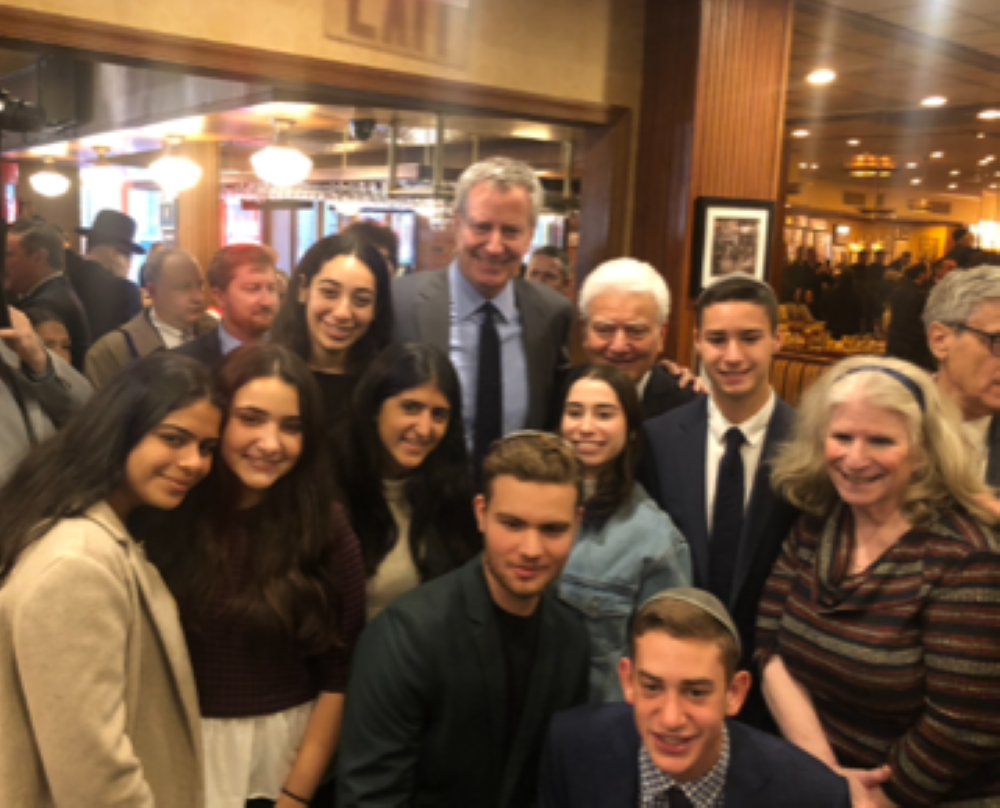By: Dr. Dan Miller, Ph.D. & Joyce Vetere Milowski
On Friday November 1, New York City Mayor Bill DeBlasio paid a visit to the downtown Brooklyn area to remind voters that Tuesday November 5, was Election Day and that there was still time for early voting, which would end on Monday, November 4.
Standing with the mayor for the announcement was the honorable David Weprin, a New York State Assembly Member from Queens, who is the Democratic candidate for New York City Comptroller.
Assembly member Weprin had served as a member of the City Council and chaired the very important City Finance Committee. Weprin’s father, Saul was a very popular assemblyman from Queens who rose through the ranks of politics to be elected by his peers as Speaker of the New York State Assembly when Mario Cuomo was the Governor of New York.
This year was the first time that New Yorkers had an option to head to vote early. This was an effort to get more registered voters to come out to the polls, something that has not been the case for decades.
The time to vote early has ended. The period to vote early was open from October 26 to November 3. Reports have surfaced that the early voting process was smooth with few complaints.
The Polls will be open on Tuesday in New York City and the counties of Nassau, Suffolk, Westchester, Rockland, Orange, Putnam, Dutchess and Erie from 6:00AM and close at 9:00PM.
There are three major races in this year’s general election.
- Public Advocate: The city’s Public Advocate is the peoples’ representative in city government, and also the next in line to become mayor (if the mayor were unable to continue to do his job)This year’s election is between Democratic Public Advocate Jumaane Williams (who won February’s special election, following an unsuccessful run for State Attorney General) and Republican City Councilmember Joseph Borelli, and Libertarian Devin Balkin.
- Queens District Attorney: District attorneys are the lead prosecutors in their boroughs, in charge of setting criminal justice policies and prosecuting criminal court cases. Democratic Queens Borough President Melinda Katz—who won a very tight primary against public defender Tiffany Cabán—is facing off against Republican and former NYPD officer Joseph W. Murray.
- Council District 45: Three candidates are running to represent the City Council’s 45th district in Brooklyn, which is made up of Flatbush, East Flatbush, Midwood, Marine Park, Flatlands, and Kensington. The three candidates are Democratic incumbent Farah Louis, U.S. Marine Corps veteran Anthony Beckford, and Libertarian David Fite.
There are also five Important Proposals on the Ballot:
This year’s five ballot measures will directly affect the New York City Charter, the document that gives shape to the city’s government. Here’s a rundown on the five measures voters have the opportunity to green-light or shoot down:
Ballot Question 1: Elections: This proposal would bring Ranked Choice Voting to the city’s primary and special elections for Mayor, Public Advocate, Comptroller, Borough President, and the City Council beginning in January 2021. In an RCV electoral system, voters would be able to rank their top five candidates for each position; the candidate who receives the most first-choice votes would win. RCV would create separate run-off primary elections for Mayor, Public Advocate, and Comptroller obsolete.
Ballot Question 2: Civilian Complaint Review Board: This item relates to the board that’s in charge of investigating allegations of abuses of power and misconduct by police. If approved, it would add two members to what is now a 13-person team, with one appointment coming from the Public Advocate and the other jointly appointed by the Mayor and Speaker of the City Council. It would also require the NYPD’s commissioner to provide more insight into its disciplinary decisions should they stray from the CCRB’s recommendation, among other measures.
Ballot Question 3: Ethics and Government: If passed, this proposal would add an extra year onto the current one-year gap that former elected officials must wait to lobby the agency or branch of government that they served within.
Additionally, the measure would change how some members are appointed to the Conflicts of Interest Board. Under the change, two members that the Mayor currently selects, one member each would be appointed by the City Comptroller and the Public Advocate, respectively. Employees of the Conflicts of Interest Board won’t be allowed to donate more than $400 in each election cycle, and will be prohibited from participating in campaigns for local elected officials.
The measure also would create a mayoral office of the Minority- and Women-Owned Business Enterprise and require that agency’s citywide director to report to the Mayor
Ballot Question 4: City Budget: If approved, this measure would create a “rainy day fund” that would allow the municipality to save money when the city is faring well financially for future times of financial hardship. It would also set minimum budgets for the Public Advocate and Borough Presidents based off their Fiscal Year 2020 budgets.
The Mayor’s office would also be required to give the City Council information it needs to formulate the city budget earlier in the year.



